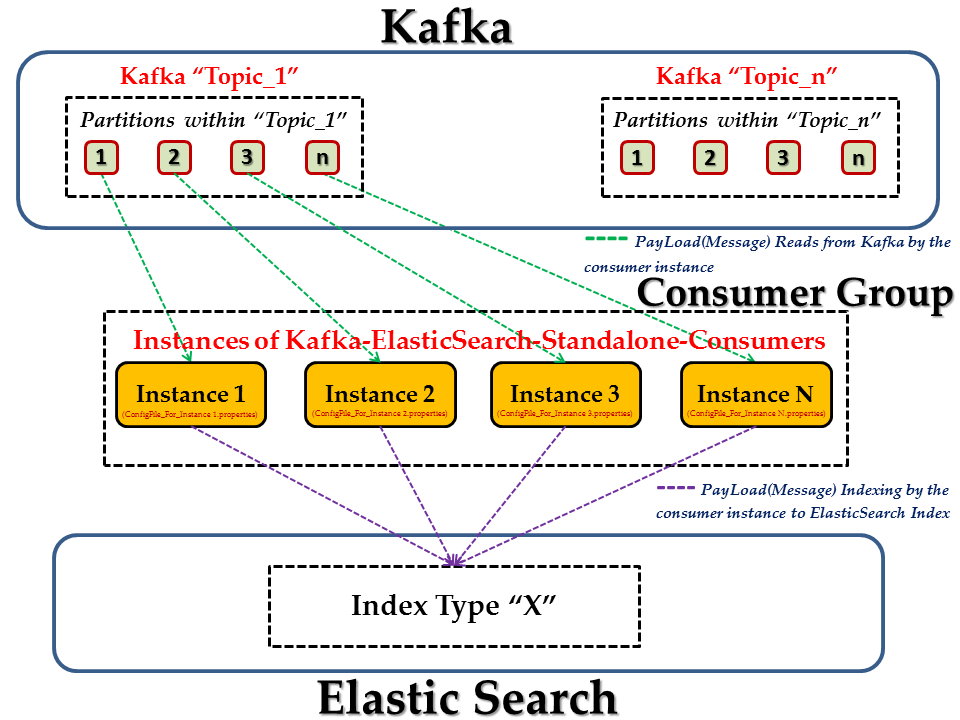Kafka Standalone Consumer will read the messages from Kafka, processes and index them in ElasticSearch.
-
Kafka has a topic named, say
Topic_1 -
Lets say,
Topic_1has 5 partitions. -
Now, there is a needed to read, process the messages from Kafka and ElasticSearch
-
In order to do that, have 5 Config Files and start 5 instances of this Standalone Consumer by tying each config file to the respective Consumer Instance.
-
Now, we will have 5 Consumer Standalone Daemons running, listening & processing messages from each partition of
Topic_1in Kafka. -
When there is a new partitions(say
6th partition) in the sameTopic_1, then start a new Consumer Daemon instance pointing to the new partition(i.e: 6th partition) -
This way, there is a clear way of subscribing and processing messages from multiple partitions across multiple topics using this Stand alone Consumer.
**1. Download the code into a $CONSUMER_HOME dir.
**2. cp $CONSUMER_HOME/src/main/resources/kafkaESConsumer.properties.template /your/absolute/path/kafkaESConsumer.properties file - update all relevant properties as explained in the comments
**3. cp $CONSUMER_HOME/src/main/resources/logback.xml.template /your/absolute/path/logback.xml
specify directory you want to store logs in:
adjust values of max sizes and number of log files as needed
**4. build/create the app jar:
cd $CONSUMER_HOME
mvn clean package
The kafka-es-consumer-0.2.jar will be created in the $CONSUMER_HOME/bin, with all dependencies included into the JAR
**5. run the app [use JDK1.8] :
java -Dlogback.configurationFile=/your/absolute/path/logback.xml -jar $CONSUMER_HOME/bin/kafka-es-consumer-0.2.jar /your/absolute/path/kafkaESConsumer.properties
1. Download the code. Let's say, $CONSUMER_HOME contains the code.
2. From the $CONSUMER_HOME, build the maven project. - this step will create the JAR file with all Consumer dependencies inside, in the $CONSUMER_HOME/bin directory
mvn clean package
3. Create a config file for the Consumer Instance and provide all necessary properties. - Use the existing Config file $CONSUMER_HOME/src/main/resources/kafkaESConsumer.properties.template` as template.
cp $CONSUMER_HOME/src/main/resources/kafkaESConsumer.properties $CONSUMER_HOME/config/<consumerGroupName><topicName><PartitionNum>.properties
vi $CONSUMER_HOME/src/main/resources/<consumerGroupName><topicName><PartitionNum>.properties - Edit & provide the correct config details.
These files will be copied into the $CONSUMER_HOME/bin/classes/ dir after the build. The details & guide for each property in the config file is given in the property file itself.
4. Start the Consumer as follows:
cd $CONSUMER_HOME/scripts
vi consumerNew.sh
Provide the value for all the below variables:
# Setup variables
#Set the full path of top directory of this kafka consumer
base_dir=
JAVA_HOME=
#User as which the Consumer Daemon has to be run
USER=
./consumerNew.sh -p start -c $CONSUMER_HOME/config/<consumerGroupName><topicName><PartitionNum>.properties
# ' -p ' - Can take either start | stop | restart
# ' -c ' - the config file for the consumer instance with path
# (e.g: '$CONSUMER_HOME/config/<consumerGroupName><topicName><PartitionNum>.properties')
5. Confirm the successful start of the Consumer by looking into:
The below log file contains INFO during starting, restarting & stopping the Consumer Instance.
#'$consumerGroupName,$topic,$partition' - properties as defined in the consumer instances's config file (i.e: '<consumerGroupName><topicName><PartitionNum>.properties' in this example
vi $CONSUMER_HOME/processLogs/<$consumerGroupName>_<$topic>_<$partition>.out
The below log file contains ERROR during starting, restarting & stopping the Consumer Instance.
#'$consumerGroupName,$topic,$partition' - properties as defined in the consumer instances's config file (i.e: '<consumerGroupName><topicName><PartitionNum>.properties' in this example
vi $CONSUMER_HOME/processLogs/<$consumerGroupName>_<$topic>_<$partition>.err
6. Monitor the processing in the log file defined by the following property in the Consumer's Respective Config file.
7. To Stop the Consumer Instance:
cd $CONSUMER_HOME/scripts
./consumerNew.sh -p stop -c $CONSUMER_HOME/config/<consumerGroupName><topicName><PartitionNum>.properties
8. To Restart the Consumer Instance:
cd $CONSUMER_HOME/scripts
./consumerNew.sh -p restart -c $CONSUMER_HOME/config/<consumerGroupName><topicName><PartitionNum>.properties
The details of each config property can be seen in the template file (below)
Config File with details about each property
-
org.elasticsearch.kafka.consumer.MessageHandleris an Abstract class that has most of the functionality of reading data from Kafka and batch-indexing into ElasticSearch already implemented. It has one abstract method,transformMessage(), that can be overwritten in the concrete sub-classes to customize message transformation before posting into ES -
org.elasticsearch.kafka.consumer.messageHandlers.RawMessageStringHandleris a simple concrete sub-class of the MessageHAndler that sends messages into ES with no additional transformation, as is, in the 'UTF-8' format -
Usually, its effective to Index the message in JSON format in ElasticSearch. This can be done using a Mapper Class and transforming the message from Kafka by overriding/implementing the
transformMessage()method. An example can be found here:org.elasticsearch.kafka.consumer.messageHandlers.AccessLogMessageHandler -
Do remember to set the newly created message handler class in the
messageHandlerClassconfig property of the consumer instance.
-
org.elasticsearch.kafka.consumer.IndexHandleris an interface that defines two methods: getIndexName(params) and getIndexType(params). -
org.elasticsearch.kafka.consumer.BasicIndexHandleris a simple imlementation of this interface that returnes indexName and indexType values as configured in the kafkaESConsumer.properties file. -
one might want to create a custom implementation of IndexHandler if, for example, index name and type are not static for all incoming messages but depend on the event data - for example customerId, orderId, etc. In that case, pass all info that is required to perform that custom index determination logic as a Map of parameters into the getIndexName(params) and getIndexType(params) methods (or pass NULL if no such data is required)
-
Do remember to set the index handler class in the
indexHandlerClassproperty in the kafkaESConsumer.properties file. By default, BasicIndexHandler is used
kafka-elasticsearch-standalone-consumer
Licensed under the Apache License, Version 2.0 (the "License"); you may
not use this file except in compliance with the License. You may obtain
a copy of the License at
http://www.apache.org/licenses/LICENSE-2.0
Unless required by applicable law or agreed to in writing,
software distributed under the License is distributed on an
"AS IS" BASIS, WITHOUT WARRANTIES OR CONDITIONS OF ANY
KIND, either express or implied. See the License for the
specific language governing permissions and limitations
under the License.
